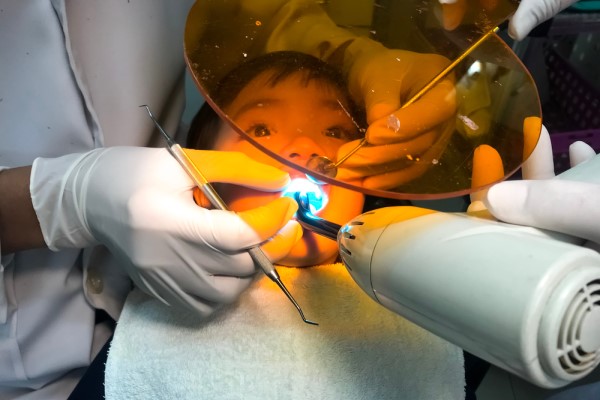5 Things To Know About Early Childhood Cavities

Concerned about early childhood cavities? Read on to learn more about how they affect children. Cavities are one of the most common oral health issues that pediatric dentists treat. It can be helpful for parents to understand more about early childhood cavities, including the dangers they present to the child’s long-term oral health.
5 Things you should know about early childhood cavities
Early childhood cavities may have an impact on the development of permanent teeth. Additionally, cavities in children can increase the risk of other oral health concerns such as an oral infection or the early loss of primary teeth.
1. Early childhood cavities can happen to children of any age
All too many parents wait an extended amount of time to bring their child into the pediatric dentist's office for their first visit. Unfortunately, teeth are often more vulnerable to cavities when they first emerge, and children as young as a year old can develop early childhood cavities that require treatment. Consequently, it is important to visit the pediatric dentist early and focus on prevention rather than restoration.
2. Cavities on baby teeth can affect the development of permanent teeth
A common misconception that many parents have is that the best thing to do for primary teeth with cavities is to leave them how they are. The thought here is that they are going to fall out anyway. However, the development and health of primary (baby) teeth can impact the development of permanent teeth. Specifically, the early loss of baby teeth due to cavities can lead to orthodontic (alignment) concerns with permanent teeth, leading to the need for orthodontic care later in childhood.
3. Cavities in children can become painful
Cavities in children, much like adults, can become painful, and this can not only impact their ability to function but their development, as well. Additionally, children may not know how to explain their tooth pain and seek assistance on their own, so checking your child’s oral health regularly and having them visit the dentist for routine cleanings is important.
4. Early childhood cavities can lead to more severe oral health concerns
If left untreated for an extended amount of time, early childhood cavities can lead to more severe oral health concerns such as deep tooth decay and tooth infection. When this occurs, the treatment options are more limited, and more invasive and expensive procedures such as a baby root canal or tooth extraction may be necessary.
5. Treating early childhood cavities promptly can help parents save money
The fact is, preventive dentistry is more affordable than restorative dentistry, and parents can save a lot of money through regular pediatric dentistry visits for their child, rather than having to pay for dental cavity fillings, baby root canals, and tooth extractions.
FAQs about childhood cavities
It is encouraged to ask any questions you have about your child’s oral health during a consultation visit with a dentist. Here are severe questions and answers about early childhood cavities specifically.
What are the treatment options for early childhood cavities?
There are several treatment options for early childhood cavities. For mild cavities, dental fillings are typically recommended. For more severe cavities, particularly those that extend closer to the tooth’s root, a baby root canal procedure is likely necessary to save the tooth and restore its size.
How can I help prevent early childhood cavities?
The best way to prevent early childhood cavities is to keep the enamel of your child’s teeth as strong as possible. This can be achieved through a consistent brushing and flossing schedule; the use of fluoride mouthwash may be recommended, as well. It is also helpful to limit your child’s consumption of sugar and other carbohydrates.
What are the long-term consequences of early childhood cavities?
The long-term effects of early childhood cavities depend on the child’s age, the number of teeth affected, and the location of the affected teeth. If the cavities develop right before they naturally fall out and are replaced with permanent teeth, then there may be no notable negative effects. However, if the early childhood cavities develop and cause concerns while the child is still relatively young, then they could lead to alignment and spacing concerns, likely leading to a need for orthodontic treatment.
Ready to schedule a visit?
You can contact our pediatric dentistry office today if you have questions about early childhood cavities or would like to schedule a visit for your child. We enjoy meeting new patients, and we look forward to helping you and your child with your dental health needs.
Request an appointment here: https://www.hvkidsmiles.com or call Hudson Valley Pediatric Dentistry at (845) 363-4177 for an appointment in our Middletown office.
Check out what others are saying about our services on Yelp: Read our Yelp reviews.
Recent Posts
If a cavity develops and worsens, it could lead to the risk of a dental emergency due to an infection or severe discomfort. Dental sealants significantly reduce the risk of a dental emergency by helping to prevent cavities in vulnerable areas of teeth. Read on to learn how dental sealants can prevent a dental emergency…
Protecting your child's teeth from cavities is crucial, and dental sealants can play a significant role in preventive dentistry. These sealants are applied to the chewing surfaces of your child's molars and premolars, providing an extra layer of protection against cavities that often occur in the pits and fissures of teeth. By opting for dental…
According to the National Institute of Health, tooth decay is the most common chronic illness in the United States, with millions of people affected by minor to severe cavities. This common oral health issue is why dentists recommend that children get dental sealants as a preventive measure. Continue reading to learn more about how dental…
Dental sealants safeguard your child’s back teeth against tooth decay and infections. Although the process is painless, children can still experience some anxiety once they know they must endure a procedure. The following article will outline what parents can expect their child to experience during the dental sealant process to help calm them before the…


